Our skin is an incredibly complex and vital organ, and it is often overlooked when we talk about the human body. However, it is important to remember that our skin is actually the largest organ in the body, and it plays a crucial role in protecting us from external threats, regulating our temperature, and providing us with sensory information.
The skin is made up of three layers: the epidermis, dermis, and subcutaneous tissue. The epidermis is the outermost layer of the skin, and it is composed mainly of dead skin cells that are constantly shed and replaced. The dermis is the middle layer of the skin, and it contains the hair follicles, sweat glands, and nerve endings. The subcutaneous tissue is the innermost layer of the skin, and it is made up of fat and connective tissue.
One of the most important functions of the skin is to protect our body from external threats, such as harmful bacteria and viruses, as well as physical and chemical damage. The epidermis acts as a barrier, preventing these threats from entering our body, while the sweat glands produce sweat, which helps to cool the body down and flush out toxins.
The skin also plays a crucial role in regulating our body temperature. When we get too hot, the blood vessels in our skin dilate, allowing more blood to flow to the surface of the skin. This increases heat loss through radiation and evaporation, helping to cool the body down. Conversely, when we get too cold, the blood vessels in our skin constrict, reducing blood flow to the surface of the skin and conserving heat.
Another important function of the skin is to provide us with sensory information. The nerve endings in the skin allow us to feel touch, pressure, pain, and temperature. This information is transmitted to the brain, where it is processed and interpreted.
In addition to these functions, the skin also plays a crucial role in our appearance and self-image. Our skin is often the first thing that people notice about us, and it can have a significant impact on our confidence and self-esteem. Skin conditions such as acne, eczema, and psoriasis can be particularly challenging for people, as they can affect not only their physical appearance but also their mental health and well-being.
In conclusion, our skin is the largest organ in our body, and it plays a crucial role in protecting us from external threats, regulating our body temperature, providing us with sensory information, and contributing to our appearance and self-image. It is important that we take care of our skin by practicing good hygiene, protecting it from the sun, and seeking medical attention when necessary. By doing so, we can ensure that our skin continues to serve us well for many years to come.

